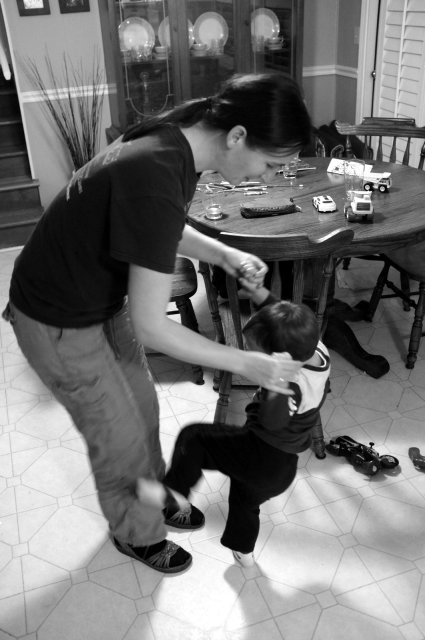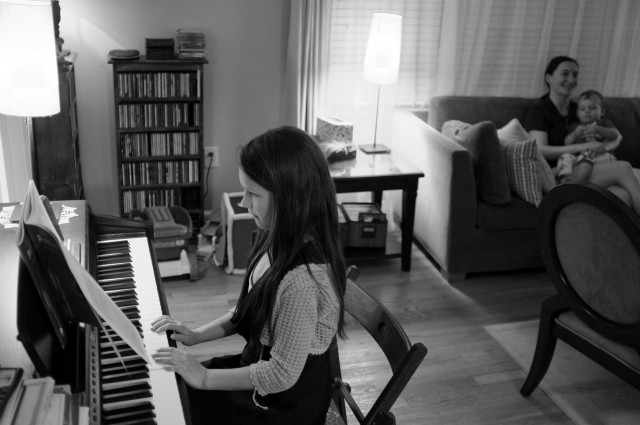Alf Prøysen performs his Noregian carol, “Musevisa”
Collision of Centuries
Lullaby
What Blues Should Sound Like
Bracia Patrzcie Jeno
Dancing
The Once and Future Carpenter
On the Wall
And just about everywhere else.
OK Go has always made music videos that make you stop and watch, but this one beats just about everything else they’ve done.
Practice
Nostalgia
Some songs send you back into the past in an almost palpable way.
Hurt

I’ve never been a fan of Trent Reznor’s band Nine Inch Nails. Industrial just doesn’t really get it for me, and their seeming sense of self-importance was always a turn-off. Their song “Hurt” seems to me a perfect example of this. A whinny voice that belies the lyrics: any pain this guy’s felt is first-world pain, that strange phenomenon that often manifests itself in teens as cutting. Of course, a close listening shows that it’s about heroin addiction.
Still — first world issues with that voice.
Then I heard that Johnny Cash had done a version.

Nothing new or all that surprising: Cash has covered bands as non-country as Danzig and Soundgarden. He’s musically adventurous. But it was more than the novelty of it that excited me as I began listening: it was his voice, that deep bass-baritone that, unlike Reznor’s nasally voice, didn’t belie the text.
“He’s a man who’s felt pain, and whose voice won’t sound like a whinny kid.”
The real musical test of a song, though, is to remove the vocals, to strip it down to the the music alone. If it stands that way, it’s a good song. Enter: 2cellos.
The Pixies
There is only one band about which I can say, “I remember the first time I heard them — when, where, with whom — as well as the song and my immediate reaction.” The Pixies. I was visiting a friend, sitting in her living room with about four or five other friends, during my senior year when she said, “You’ve got to hear this.”
I was simultaneously appalled and fascinated. I bought the album shortly after that, though, so clearly the fascination won out. The song, called “Rock Music,” grew on me and eventually became one of my favorites on the whole album.
The Pixies have always been a group difficult to describe, and I’m not the only one who contends this. Allmusic.com beings its biography thusly:
Combining jagged, roaring guitars and stop-start dynamics with melodic pop hooks, intertwining male-female harmonies, and evocative, cryptic lyrics, the Pixies were one of the most influential American alternative rock bands of the late ’80s. the Pixies weren’t accomplished musicians — Black Francis wailed and bashed out chords while Joey Santiago’s lead guitar squealed out spirals of noise. But the bandmembers were inventive, rabid rock fans who turned conventions inside out, melding punk and indie guitar rock, classic pop, surf rock, and stadium-sized riffs with singer/guitarist Black Francis’ bizarre, fragmented lyrics about space, religion, sex, mutilation, and pop culture; while the meaning of his lyrics may have been impenetrable, the music was direct and forceful.
A few months after that first encounter, a friend sold me Doolittle, by far their best album, because he’d heard “Here Comes Your Man” and assumed the whole album was like this.
In the pre-internet days, it was all but impossible to preview a whole album, so he had no idea that the song following the pop-sweet “Here Comes Your Man” is a song about David and Bathsheba called “Dead,” one of my all-time favorite songs by the group.
Or “Crackity Jones,” in which Black Francis, the lead singer, tells the story of a crazy roommate he had while studying in Puerto Rico and in doing so expands his repertoire beyond crooning, screaming, and shrieking to include barking.
They’re not musically gifted; their lyrics are bizarre; the songs are often short blobs of confusion — all the things I say I dislike about music. Yet they’re so dang addictive.
I saw them first in 1991 or 1992 — right at the end of their existence. That first show was in Knoxville, stadium seating, and a few friends of mine and I arrived when the doors opened and sat just in front of the stage for almost two hours, securing first row “seats” and a very memorable experience. A few months after that, I saw them again in Atlanta, opening for, of all groups, U2. Then they broke up. The end. Never again.
No one could have foreseen the trend of old bands coming back together for the nostalgia of their fans and the filling of their own bank accounts. And even when bands that one would have thought had long gone by the wayside were reforming in the early years of the 2000s, I never would have guessed the Pixies would reunite. But they did. And they’re touring. And as this is published, I’ll be about twelve rows back with an old high school friend, hoping beyond all hope that they play “Rock Music.”
Musical Memory
Spotify has allowed me to wallow in music I literally haven’t heard ten or more years, which is to say wallow in nostalgia.
Play My Boy To Sleep
Few things are as rewarding as getting one’s guitar and playing in a darkened hushed room until one’s son is fast asleep.
First Music
The first album I ever bought is one I’m almost loathe to admit to now. The second, less so: Boston’s Third Stage. I was in seventh or eighth grade when I bought those albums, and it was no small feat, for my father had made a rule that he had to investigate and approve any music purchase I made. At the time, I thought it was ridiculous. As a father myself, now I understand.
Recently, L made a discovery: portable music is highly convenient. She’s been taking my iPod about, listening to whatever she finds on there that strikes her fancy. That’s almost fine: most of my music I’d willingly play for her, but there is this and that which I don’t think she’s quite ready for. Fortunately, she was more drawn to jazz than anything else. Ben Webster’s “Late Date” was a particular favorite.
Still, there’s always the risk of accidental discovery of something she’s not quite ready for. So when L suggested she buy her own MP3 player with the money she’s saved up, it seemed a good idea.
It came Wednesday, and I loaded it up with Ben Webster, Sonny Stitts, Buena Vista Social Club, Beatles, and similar selections, and K bought her the Frozen soundtrack as a first album.
And yet, as I sit here listening to the newest John Mayer on Spotify, I realize that by the time she’ll be the age I was when I first bought my first album, iPods will even seem old-school. All music available all the time.
What will she listen to?
I’m not so much worried about what she’ll listen to as I am the music her potential suitors will be drawn to. A boy who listens to misogynistic rap will likely be somewhat affected by it — at the very least, his disregard for what the man is actually saying will be worrying. Of course with the prevalence of free online porn, what the young man might be listening to might be of less concern than what he’s streaming on his phone.
All of this flashed in my thoughts as I saw L dancing about, singing along as best she could to a song she barely knows, and I thought that perhaps Babcia is right: the nineteenth century was so much better…
Chris Smither
Joyeux Noel: The Christmas Miracle of 1914
When I was in college, I was not a Deadhead — I never even saw the Grateful Dead in concert — but I was something of a McCutcheon-head, if there be such a thing. John McCutcheon is a multi-instrumentalist folk singer who is equally at home singing his renditions of spirituals and his own songs for children. In college, I saw him in concert a number of times, and there was always one song that left me truly enchanted. He introduced it most times in a similar way, telling of a concert he’d given in the early eighties when an elderly man approached him and, speaking of his song “Christmas in the Trenches,” said, “Young man, I was there.”
This was pre-internet days. One couldn’t simply Google “Christmas miracle 1914,” and it wasn’t a story I heard in history class. And that’s really too bad.
After hearing that story, I thought, “This is a fantastic story — why hasn’t anyone made a film of it.”
Tonight, K and I watched Joyeux Noel, and as I read the Netflix disc-cover summary, I thought, “Is this about that thing John McCutcheon sang about?” Indeed, it is. Well worth viewing.
Side Note
John McCutcheon is best known for his mastery of the hammered dulcimer. I once saw him in concert in Asheville, North Carolina when the power went out in the middle of a hammered dulcimer song. McCutcheon literally never missed a note though it was pitch black for at least thirty or forty seconds.

